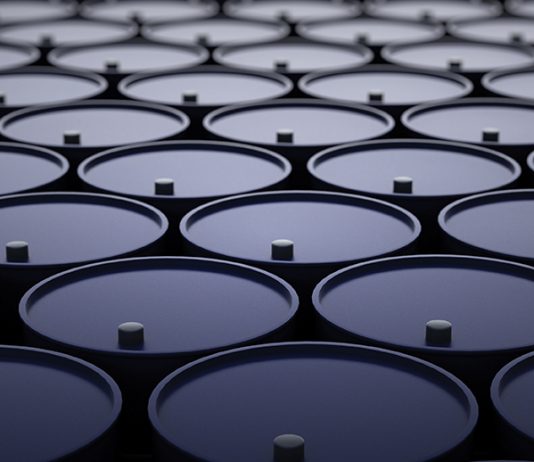
10 Things You Should Know About Oil and Gas Today
The Big Story
The June contract for West Texas Intermediate (WTI) was crashing towards single digits on Monday, just a week after we saw prices on the May contract fall into negative territory. As of this writing, WTI was selling for $12.60 per barrel, down by more than $4 on the day.
This collapse below $20 per barrel is due to the fact that crude storage in the U.S. is filling rapidly, and the market is anticipating a situation developing soon in which some producers will literally be forced to pay purchasers to take some of their production away from the wellhead.
But the big story, if largely unreported, comes from the Wall Street Journal, which reports that in reality, roughly 30-40% of U.S. crude storage is unfilled. The problem is that it is in the hands of speculators who are withholding it from producers in order to extract higher prices.
Here’s the key passage from that report:
About 30% to 40% “of storage in the U.S. is empty, but it’s all booked and in the hands of traders and operators,” said Chris Midgley, head of analytics at S&P Global Platts. “We can probably say the same for all storage around the world. There is storage available but not to rent.”
Until the world gets moving again and begins to burn off the excess oil, controlling storage is power—and Saudi Arabia has become king of it. Oil stored inside the country rose by 8 million barrels to 79 million in 2½ weeks before march 26, according to Kayrros, which uses satellite imagery to analyze commodity markets. The Saudis booked remaining capacity in an Egyptian storage facility. Still, demand fell faster than it could lease storage.
Unreal.
On to other stories in the news today:
PBPA: Brightest days for the Permian are ahead of us – Interesting op/ed from PBPA President Ben Shepperd, providing some long-term perspective about the future of America’s largest oil producing area.
Texas oil took a major hit, but it will survive – Former Texas Congressman Joe Barton provides some similarly positive perspective in the Dallas Morning News.
Failure To Help The Crashing Shale Industry Could Harm Trump’s Re-Election Chances – Excerpt:
Last Thursday, Treasury Secretary Steve Mnuchin said he was considering the creation of a lending program run by the Federal Reserve that could be accessed by oil companies that are in trouble, but this would do nothing to address the fundamental supply/demand issue that is currently cratering the domestic upstream sector. That segment of the domestic industry is either a vital piece of the Administration’s stated policy of American Energy Dominance – as the President himself has stated many times – or it isn’t. If it is, then it is incumbent on the President to take real action here.
Failure to do so could ultimately harm President Trump’s chances for re-election. The domestic shale industry is largely centered in Texas, which is likely to remain in the Trump column, but it has also become a vital cog for the economies of crucial swing states like Pennsylvania, Michigan, Ohio, Colorado and New Mexico. Pennsylvania and Michigan are two states Trump won in 2016 despite predictions by all the experts that they were safe states for Hillary Clinton. There is little doubt that the oil and gas industry’s economic impact in those states, as well as in Ohio, helped to move their electoral votes into the Trump column.
Right now, thousands of jobs and billions in economic impact are at stake in those states. If the President is seen as sitting on his hands while the industry burns down around him, those states and others could easily swing back to the Democratic Party’s eventual nominee.
The great Texas oil shutdown has begun – Excerpt:
The mass shutdown of Texas oil fields has begun after an unprecedented crash that last week drove crude prices into negative territory for the first time in history. From the Permian Basin in the west to the Eagle Ford in the south, drilling rigs are getting pulled from operation, wells are getting plugged and layoff notices are going out fast, bringing an abrupt halt to one of the world’s great oil booms.
Drilling Down: Gas well projects spike amid negative oil prices – Good analysis here from the Houston Chronicle’s Sergio Chapa.
When oil became waste: a week of turmoil for crude, and more pain to come – Excerpt:
In just a few months, the coronavirus pandemic has destroyed so much fuel demand as billions of people curtail travel that it has done what financial crashes, recessions and wars had failed to ever do – leave the United States with so much oil there was nowhere to put it.
While the unusual circumstance of negative oil prices may not be repeated, many in the industry say it is a harbinger for more bleak days ahead, and that years of overinvestment will not correct in a period of weeks or even months.
How the U.S. could use taxpayer dollars to save oil and energy companies – Excerpt:
The U.S. federal government is looking at “a whole bunch of alternatives” to support oil and other energy companies, Treasury Secretary Steven Mnuchin said on Friday as the industry struggles with plummeting prices and demand as the coronavirus crushes economic activity.
Taking equity stakes as part of a lending facility for the industry is among the alternatives, Mnuchin said at a White House event.
President Donald Trump said: “The energy business is very important to me, and we’re going to build it up.”
For Houston, a One-Two Punch: ‘It’s Going to Be Devastating’ – Analysis from the New York Times.
ExxonMobil Modifies Facilities to Produce Medical-Grade Sanitizer for COVID-19 Response – Excerpt:
Initial production of 160,000 gallons of medical grade sanitizer – enough to fill nearly 5 million 4-ounce bottles – is being distributed to medical providers and first responders. Additional donation locations are planned.
“The ingenuity and dedication of our employees to develop a consumer-ready product in record time demonstrates ExxonMobil’s commitment to help those in need during the global pandemic,” said Darren Woods, chairman and chief executive officer of Exxon Mobil Corporation. “We’re focused on keeping our people and communities safe while supporting frontline responders and meeting customer needs.”
ExxonMobil has increased monthly production of isopropyl alcohol — a key ingredient in sanitizer – by about 3,000 tonnes at its chemical manufacturing facility in Baton Rouge, Louisiana. To produce, package and distribute hand sanitizer, the company purchased additional ingredients and modified equipment in Baton Rouge and at a lubricants plant in nearby Port Allen, Louisiana.
That’s all for today.
















